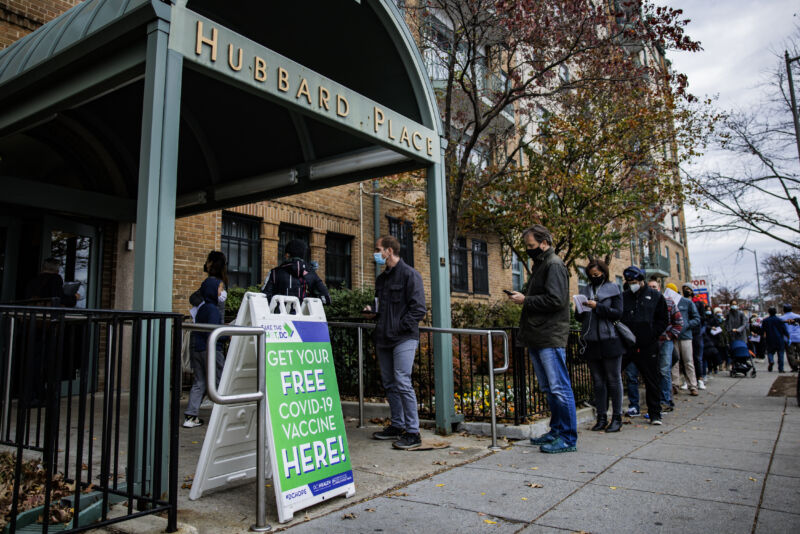
Amid a raging delta wave and fears of omicron, the United States on Thursday administered 2.2 million doses of COVID-19 vaccine, the highest single-day vaccination total since May, shortly after the shots were made widely available to adults.
More than 1 million of the shots given yesterday were booster doses, according to Jeff Zients, White House COVID-19 Response Coordinator. To date, nearly 200 million Americans are fully vaccinated, which is roughly 60 percent of the population, and 44 million are fully vaccinated and boosted.
"This is important progress," Zients said in a press briefing Friday. "Vaccines clearly remain our most important tool… If you were fully vaccinated before June, it's time for you to go get your booster. If you're unvaccinated, go get your first shot today. And if your kids are five years or older and not yet vaccinated, get them the protection of the vaccine as well."
The current vaccines are highly effective against the delta variant, which is still circulating at extremely high levels nationwide. The US tallied nearly 140,000 new COVID-19 cases Thursday, and cases are once again on the rise.
"I know that the news is focused on omicron," Dr. Rochelle Walensky, director of the Centers for Disease Control and Prevention, said during the briefing. "But we should remember that 99.9 percent of cases in the country right now are from the delta variant," she said. "Our recommendations for protecting against COVID remain the same, regardless of the variant."
Walensky went on to reiterate the importance of vaccines, boosters, indoor masking in public settings, hand washing, improving ventilation, physical distancing, and testing.
Vaccines
Health officials largely agree that these established prevention strategies will remain effective against omicron—even vaccines and boosters. That's despite the fact that there are unanswered questions about omicron's ability to evade immune responses spurred by vaccines. The highly mutated variant contains a number of changes known to thwart some neutralizing antibodies that would otherwise block the virus from causing infection and disease.
But, immunologists have emphasized in recent days that even low levels of neutralizing antibodies can be protective. There are also plenty of non-neutralizing antibodies that will remain able to attack omicron, and those antibodies can recruit protective immune cells to help fight the virus. Booster doses increase levels of both neutralizing antibodies and non-neutralizing antibodies, and the shots can increase the diversity of those antibodies as well. Moreover, there are also potent cell-based immune responses, which do not rely on antibodies and are likely to remain effective against the dreaded variant. Like antibodies, cell-based responses are also boosted by third shots.
Overall, health experts expect that omicron will reduce the effectiveness of current vaccines to some degree. But they're also rather confident that vaccines and boosters will continue to offer some protection against omicron.
"Although we haven't proven it yet, there's every reason to believe that if you get vaccinated and boosted that you would have at least some degree of cross-protection, very likely against severe disease, even against the omicron variant," top infectious disease expert Anthony Fauci said in the briefing.
Speedy spread
The assurances offer some comfort as preliminary data continues to point to omicron being able to spread much faster than delta and cause more reinfections. Some early analyses from South Africa have estimated that the variant may spread more than twice as quickly as delta and be more than twice as likely to cause reinfection in people who had COVID-19 previously. But there is still limited data, and these findings have not been peer-reviewed or published in a scientific journal. They are highly preliminary and should be interpreted cautiously.
Health officials expect it will take several weeks to collect more data on the question of omicron's transmissibility, as well as vaccine effectiveness and disease severity.
Since health officials first brought the variant to international attention last week, around 40 countries worldwide have reported cases of omicron. The US announced its first case on Wednesday in California, and several other states have identified cases since, including Minnesota, Colorado, New York, and Hawaii.
The variant is likely to have been circulating for some time before the flurry of detections. While many of the newly detected cases were in travelers who returned to their home countries from southern Africa, some were not, suggesting domestic transmission is already underway in the US and elsewhere.
reader comments
426